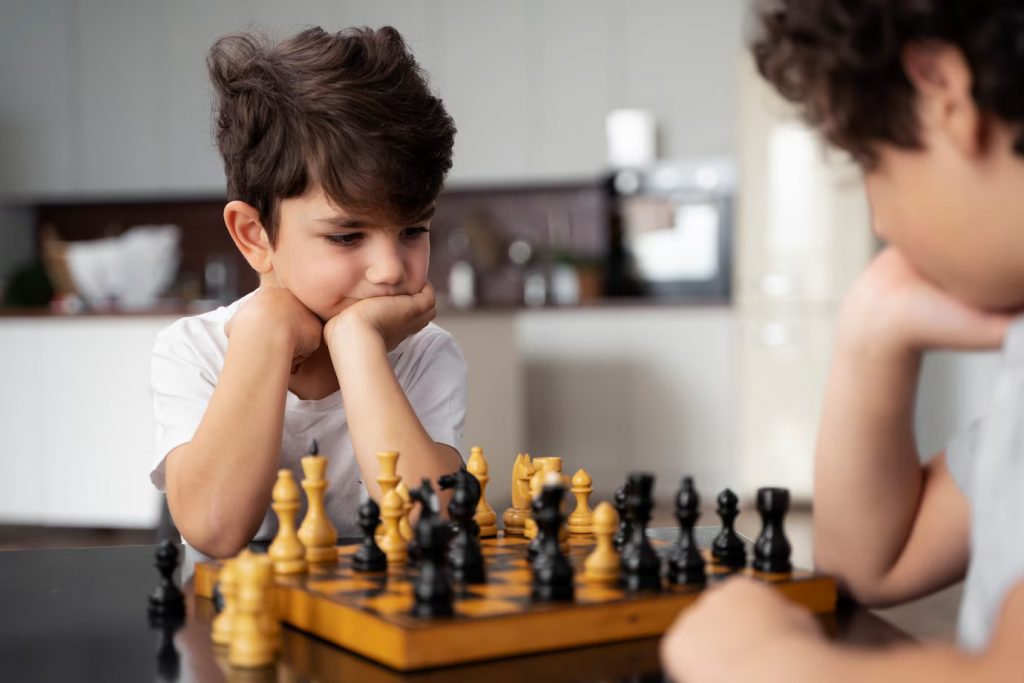The Role of Motivation
Emanuel Lasker, a former World Chess Champion, once said, “When you see a good move, look for a better one.” Motivation is that inner voice encouraging young chess players to look for that better move. It’s the driving force behind their journey to becoming better chess players.
Looking for the right mentor? Caissa School of Chess has become a top choice for players beginning their chess journey. Explore their programs to find the right fit for your young talent.
Recognizing the Tell-Tale Signs
Recognizing when young chess players need motivation is a skill in itself, and it often manifests as tell-tale signs. Keep a vigilant eye out for dwindling enthusiasm, declining performance, or a lack of focus during practice sessions. Early intervention is key, as William James wisely noted, “When you have to make a choice and don’t make it, that is in itself a choice.”
General Practices to Keep Morale High
1. Set Achievable Goals: Jim Ryun’s words resonate here – break down long-term objectives into manageable milestones. Success breeds motivation.
2. Celebrate Progress: As Emanuel Lasker advised, acknowledge and celebrate every small achievement. It keeps spirits high.
3. Positive Reinforcement: Offer praise and encouragement, emphasizing effort rather than just results. William James reminds us that choices matter, and the choice to acknowledge effort is powerful.
4. Variety in Training: Keep sessions engaging with a mix of tactics, endgames, and puzzle-solving. The variety keeps young players mentally nimble, as Jim Ryun suggested.
5. Mentorship: Encourage interaction with experienced players or mentors for inspiration. Learning from others is a time-tested motivator.
6. Mindfulness Techniques: Teach young players to manage stress and stay focused through mindfulness and relaxation exercises. This aligns with William James’ idea of making choices, including those that promote mental well-being.
7. Healthy Competition: Foster a competitive spirit without overemphasizing winning. Competition can be a powerful motivator, as it encourages young players to continuously seek that “better move,” as Lasker advised.
When to Give Up
Knowing when to let go is perhaps one of the most challenging aspects of motivating young chess players. Not every child will become a grandmaster, and it’s vital to recognize when their heart is no longer in the game. It’s not a failure but rather a shift in interests or priorities.
If you observe:
– Consistent disinterest in playing or practicing chess.
– Frequent expressions of frustration and unhappiness.
– A desire to explore other interests.
It might be time to have an open and honest conversation with the young player about their goals and aspirations. As William James pointed out, not making a choice is, in itself, a choice. Thus, it’s crucial to support their choices, whether it involves pursuing chess or exploring new horizons.
Nurture the joy of chess. Programs at Caissa School of Chess are designed not only to teach the game but also to foster a lifelong love for it.
Boosting Morale in Young Chess Players
1. 🎯 Achievable Goals: Break objectives into milestones for motivation.
2. 🎉 Celebrate Progress: Acknowledge achievements to keep spirits high.
3. 🙌 Positive Reinforcement: Praise effort over results, as choices matter.
4. 🧩 Varied Training: Engage with tactics, endgames, and puzzles for mental agility.
5. 🤝 Mentorship: Learn from experienced players for inspiration.
6. 🧘♂️ Mindfulness Techniques: Manage stress and focus through relaxation.
7. 🏆 Healthy Competition: Foster competition without overemphasizing winning.
Recognizing When to Move On
– 🚫 Consistent Disinterest
– 😔 Frequent Frustration
– 🌟 Desire for New Interests
Conclusion
Motivating young chess players is an art that combines psychological principles, understanding, and patience. As coaches and parents, we hold the responsibility of nurturing not just chess skills but also the love for the game itself. By recognizing the tell-tale signs of waning motivation, implementing effective strategies to keep morale high, and being willing to let go when necessary, we can guide our young talents towards success, happiness, and fulfillment. Remember, every move in this journey matters, and it’s our collective effort that can shape the grandmasters of tomorrow.
Shape the future of young talents. Start your journey with the Caissa School of Chess today and explore how they guide aspiring players toward their full potential.





